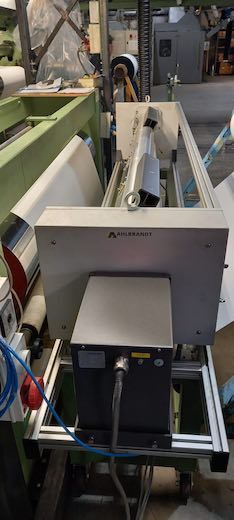Italy’s Majocchi Achieves Exacting Textile Functionality and Aesthetics With Baldwin’s Corona Treatment Technology
Press release from the issuing company

Albavilla, Como, ITALY — Majocchi, a leading Italian textile manufacturer, reports that it has achieved unprecedented functional and visual appeal with its key fabrics since installing Baldwin Technology Co. Inc.’s corona surface treatment technology.
Based in Tavernerio (Como), Majocchi has cemented itself as a leader in the global textile market by focusing extensively on applying the latest research and innovation within the field to achieve superior results.
Majocchi has a well-documented history of being a technological innovator in the textile industry. Within a decade of its conception in 1941, Majocchi became the leading global supplier of waterproof cotton for rainwear manufacturers. In the 1960s, the company began producing nylon and technical fabrics, which paved the way for it to become a leading provider of textiles for urban fashion, technical workwear and the military today.
Taking it to the next level, for over a year, Majocchi has partnered with U.S -based Baldwin Technology Co. to utilize its unrivaled corona surface-treatment technology to produce superior wettability and adhesion.
Corona treatment is a technique that temporarily modifies a substrate’s surface tension properties. The corona oxidation process improves the penetration and absorption of liquids on cellulosic and synthetic fabrics. Utilizing corona treatment before resin application on fabrics such as lycra and nylon facilitates superior adhesion and resin distribution. As a result, corona-treated fabrics provide exceptional color and tonal quality.
Majocchi uses Baldwin’s Corona Pure Model to apply polyurethane and acrylic-based coatings to its fabrics. The system allows Majocchi to administer a controllable, uniform coating to achieve the desired functionality and aesthetics.
The system is 2,000 millimeters wide with a discharging station and four ceramic electrodes designed for textile applications with the flexibility of customizing plasma dosage for a given fabric structure, width and process speed. The Corona Pure model allows for fabric treatment up to 300 gr/m² in thickness. The system is highly customizable, with single-sided and dual-sided treatment capabilities.
“With Baldwin’s corona treater, we continue our sustainable innovation process towards goals previously unachievable,”said Andrea Terracini CEO of Majocchi.
Rick Stanford, Baldwin Vice President of Global Business Development, Textiles commented: “We appreciate Majocchi’s continued confidence in Baldwin’s textile technologies. As textile manufacturers and brands are increasingly looking for process solutions to assist in reaching their sustainability goals, Corona Pure treatment is another tool alongside TexCoat G4 digital finishing in Baldwin’s portfolio of sustainable technology.”
Baldwin’s corona treatment system is built with the operator in mind. The “Easy Change” feature allows for a seamless replacing of electrodes and rapid cleaning and removal of fiber and dust residue, maintaining optimal exhaust air flow. The treatment system is built with a swiveling housing mechanism, which provides clearance for changes in textile thickness and protects the ceramic electrodes.
Baldwin, based in St. Louis, Missouri, offers the market’s most efficient?corona/plasma treatment systems?with high-performance electrodes ensuring effective surface treatment for enhanced dyeing, coating and adhesion on a variety of textile materials. The slim design enables easy integration and retrofit into existing production lines, and the system’s features allow for fast and easy service.
Baldwin’s solutions are frequently used in the manufacturing of upholstery fabrics, anti-microbial fabrics intended for on-skin contact, and water-repellent fabrics used for jackets, raincoats, backpacks, and similar waterproof garments and items. They’re also used for laminated fabrics like those used for swimwear, dresses and intimates, and softened fabrics that are intended for apparel like t-shirts and pants.
- Questions to ask about inkjet for corrugated packaging
- Can Chinese OEMs challenge Western manufacturers?
- The #1 Question When Selling Inkjet
- Integrator perspective on Konica Minolta printheads
- Surfing the Waves of Inkjet
- Kyocera Nixka talks inkjet integration trends
- B2B Customer Tours
- Keeping Inkjet Tickled Pink
© 2024 WhatTheyThink. All Rights Reserved.














